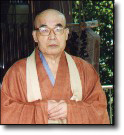 Today, the Okinawan Karate, born in Okinawa, is being globalized, and last year, a world meet was held in Okinawa on a grand scale. With this trend as a turning point, it seems indispensable to me to give a serious reconsideration on the cultural value of Karate vhich we can be proud of throughout the world.
Today, the Okinawan Karate, born in Okinawa, is being globalized, and last year, a world meet was held in Okinawa on a grand scale. With this trend as a turning point, it seems indispensable to me to give a serious reconsideration on the cultural value of Karate vhich we can be proud of throughout the world.
On the other hand, with the popularization of Okinawan karate abroad, various questions have so far been raised from among the Karate teachers and students of the foreign countries. In trying to grasp the core of Karate, they tend to ask such questions as: “What is the relation between the Karate as a sport and the Karate as a martial art?”, and “What is the spiritual and cultural aspect of Karate through which we are supposed to build up our personality?”
Some Karate teachers and students express their yearning for the Oriental culture which they hope they may be able to understand by deepening their Karate practice.
With the popularization ot Karate throughout the world as mentioned above, certain Karate teachers from abroad are not satified any longer by a mere training of Kata or by the physical training in the form of contests and matches, but they seem to be seriously longing for salvation of their souls through Karate practice.
Under these circumstances, we have to realize that a time has come when we have to appreciate the Okinawan Karate from a broader viewpoint. The quality of the Okinawan Karate should be elevated as that of a martial art through which we can complete our personality.
There are three kinds of Karate: Karate of a lion, Karate of a tiger. and Karate of a fighting dog. When the Karate player stays as quiet as a saint keeping his power inside, and is able to win without fighting, we call his Karate Karate of a lion. Even if the Karate player has strength, we call his karate Karate of a tiger if he appears full of fighting spirit. If the Karate player is always concerned about fighting, and enjoys fighting, we call his Karate Karate of a fighting dog. I earnestly hope that you teachers and students will be so wise to make the choice of the kind of Karate that you will practice and transmit. I earnestly hope that you exert yourselves to make the Okinawan Karate Karate of a lion. This is the essential point in order to qualify the Okinawan Karate as a martial art.
In his lecture titled “On Karate-Do”, given in Osaka in 1936. Teacher Chojun Miyagi, a Saint of Karate, expressed his philosophy as follows:
“The core of the Karate-Do is so profound that it can only be comprehended when, as in the case of the martial arts in general, the player can completely grasp the meaning of ‘Transmission outside sciptures and not relying on letters'”.
I was very deeply impressed to know how earnestly and tacitly Teacher Miyagi exerted himself in approaching the core of Karate. I should say Teacher Miyagi is the very Saint of Karate who taught us ‘The Karate of a Lion’.
There is an aphorism that ‘if your heart and mind are not right then your sword (Karate) can not be right’. From ancient times swordsmen and karate students used to place importance on this aphorism. In the world of sports where people tend to be attached to the winning and losing, it may be difficult to understand what “right heart and mind” and “right swords” mean. However, this aphorism has a very significant and fundamental philosophy of martial arts based on which the martial arts can become a culture, giving us a guidance as to how to live.
I sincerely hope that you always realize that Karate is never a means of killing and injuring people, but that the purpose of Karate is to train your body and spirit and pave a way towards creation of a peaceful society.
Thank you very much.
The above was derived from a transcript available at the IOGKF Italy pages.
